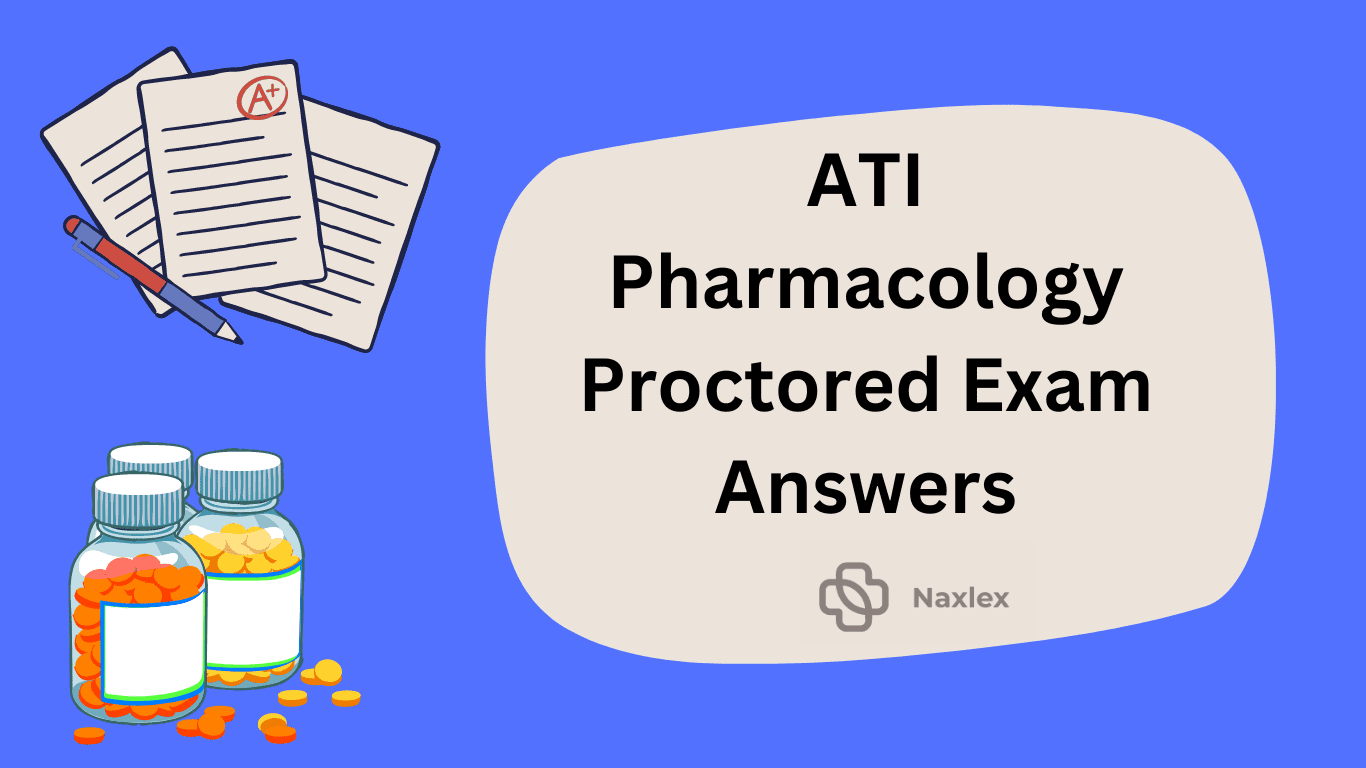Could you be struggling to get the haven for ATI pharmacology proctored exam answers? Or are you looking for ATI pharmacology exam prep materials that will help you pass your exam easily? At Naxlex Nursing, we understand how challenging pharmacology is , so, we’ve prepared the right strategies and tools, so you can excel without taking a retake.
Naxlex Nursing offers nursing-related study materials to help you pass the most crucial exams in your nursing career. In addition, we boast of having well-researched and explained ATI pharmacology proctored exam answers. So, if you want to practice how to answer your pharmacology exam, Naxlex Nursing offers reputable practice materials at an affordable rate.
Use our wide range of study resources like practice tests, study guides, and test banks and change the perception that the ATI pharmacology exam is challenging. Start your preparation today with Naxlex nursing and pass with an A.
Is the ATI Pharmacology Exam Hard?
Yes, most students find the ATI pharmacology examination hard because it mainly focuses on medication, how and when to administer it to a patient, and potential side effects. You will cover a lot of medication, which you must memorize to pass your exam.
Furthermore, this multifaceted subject necessitates significant reading, which can be intimidating for students. However, with suitable study materials, such as those provided by Naxlex Nursing, you can better understand pharmacology and potentially excel in exams like the ATI pharmacology proctored exam without excessive difficulty. Moreso, these materials likely offer valuable resources and guidance to help students navigate the complex world of pharmacology more effectively.
Read More: Maternal Newborn Secrets Study Guide
Topics covered in ATI Pharmacology

Here are the main topics you will face when pursuing ati pharmacology proctored exam answers;
- Drug Classification: The categorization of medications based on their intended therapeutic use, chemical composition, or mode of action.
- Drug Kinetics: Examining how drugs are absorbed, distributed, metabolized, and eliminated within the body (ADME).
- Drug Dynamics: Understanding how drugs influence cells, tissues, and organs within the body to produce their effects.
- Forms of Dosage: Various ways drugs are prepared for administration, such as tablets, capsules, liquids, or injections.
- Methods of Administration: The routes through which drugs are introduced into the body, encompassing oral, intravenous, intramuscular, subcutaneous, and topical routes.
- Therapeutic Indications: Knowledge of the medical conditions, specific drugs prescribed, and their intended therapeutic benefits.
- Undesirable Effects and Adverse Reactions: Identifying potential unfavorable outcomes and harmful responses that drugs may induce.
- Drug Interactions: Understanding how drugs can interact with each other, potentially leading to modified effects or adverse consequences.
- Contraindications: Recognition of situations or conditions where a drug should not be used due to potential risks.
- Nursing Responsibilities: The responsibilities of nurses are to ensure the safe administration of medications, including dose calculation, patient education, and monitoring.
- Patient Assessment: The evaluation of a patient’s health status, medical history, and vital signs before administering medications.
- Medication Administration: Correct drug administration methods, including dosage determination, timing, and record keeping.
- Patient Education: Furnishing patients with medication information, including instructions, possible side effects, and safety precautions.
- Medication Safety: Strategies to prevent medication errors include double-checking doses and verifying patient identity.
- Monitoring and Evaluation: You tackle continually assessing a patient’s response to medications and implementing necessary adjustments.
Also Check Out: ATI Critical Thinking Exam Test Bank
Let’s check pharmacology questions:
Sample Questions
Question 1.
Which drug classification is commonly used to treat inflammation, and pain and can also reduce fever?
a) Antibiotics
b) Diuretics
c) Analgesics
d) Antihypertensives
Answer Explanation: c) Analgesics
Analgesics are medications used to relieve pain and inflammation. They can also reduce fever. Common examples include ibuprofen and acetaminophen.
Question 2:
Which medication classification is typically prescribed to reduce heart workload and reduce blood pressure?
a) Antibiotics
b) Anticoagulants
c) Antipyretics
d) Antihypertensives
Answer Explanation: d) Antihypertensives
Antihypertensives are drugs designed to lower blood pressure and decrease the strain on the heart. Examples include ACE inhibitors and beta-blockers.
Question 3:
A patient on antipsychotic medication presents with involuntary muscle movements. Which class of medications is most likely responsible for these extrapyramidal side effects (EPS)?
a) Antihypertensives
b) Antibiotics
c) Anticoagulants
d) Antipsychotics
Answer Explanation: d) Antipsychotics
Extrapyramidal side effects (EPS) are a common adverse effect of antipsychotic medications. These may include muscle rigidity and involuntary movements such as dystonia or akathisia.
Question 4:
What is the primary action of diuretics in the body?
a) Increase blood pressure
b) Decrease urine production
c) Promote sodium and water retention
d) Increase urine production
Answer Explanation: d) Increase urine production
Diuretics are medications that increase urine production, leading to the removal of excess sodium and water from the body. This action helps lower blood pressure and reduce edema.
Conclusion
Giving out all ATI pharmacology proctored exam answers correctly is crucial for excelling in this subject and your nursing education. Fortunately, Naxlex nursing saves you the time of going through a pile of books and has condensed every vital topic in pharmacology study materials, ensuring you don’t miss any crucial point.
We pride ourselves on offering over 2,000+ pharmacology test bank questions to help you prepare for your exams and the answers are well illustrated to ensure you get extra material to revise.



